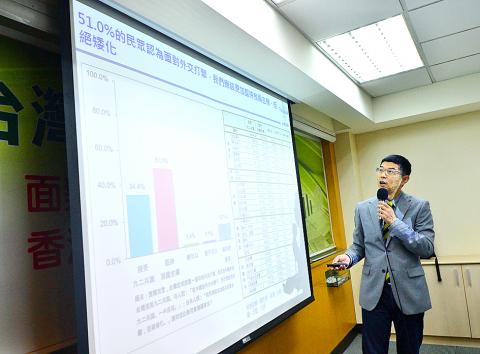More than half of Taiwanese view the “one country, two systems” framework as a failure and support the nation “going its own way” as Hong Kong marks the 20th anniversary of its handover to China, a survey published yesterday by the Taiwan Thinktank showed.
More than 52 percent of respondents said that the “one country, two systems” model applied in Hong Kong has proved a failure, with only 22 percent viewing it as a success.
More than 63 percent were pessimistic about Hong Kong’s democracy, with only 22 percent expressing optimism.

Photo: Wang Yi-sung, Taipei Times
Proposed by former Chinese leader Deng Xiaoping (鄧小平) in the 1980s, the formula of extensive local autonomy beneath overarching Chinese sovereignty was initially directed at Taiwan before being applied to Hong Kong in 1997, but has failed to win local support.
More than 73 percent of respondents said they are not willing to accept reunification under a “one country, two systems” formula, with only 19 percent expressing support.
Numerous other questions focused on how the nation should respond to China’s diplomatic offensive following the severing of relations with Panama and forced changes to the name of numerous overseas representative offices.
When asked how to respond to China’s offensive, 40 percent of respondents chose “going our own way,” compared with 33 percent in favor of “maintaining the status quo” and 18 percent who opted for “compromising with China.”
When asked whether the nation should accept the so-called “1992 consensus” or insist on maintaining sovereignty, 51 percent chose maintaining sovereignty, compared with 34 percent who preferred to accept the “1992 consensus.”
Fifty-five percent supported referring to foreign representative offices in Taiwan to being “stationed in Taiwan” — as was the practice during former president Chen Shui-bian’s (陳水扁) term — rather than being “stationed in the Republic of China,” with 28.4 percent opposing the proposal.
More than 69 percent of respondents supported shifting resources from maintaining formal ties with the nation’s 20 remaining diplomatic allies to “participating in international society.”
“Regardless of name usage, where to invest our diplomatic resources or the overall direction for our foreign policy development, there seems to be some divergence between public opinion and the government’s current track,” Taiwan Thinktank deputy executive director Lai I-chung (賴怡忠) said, referring to President Tsai Ing-wen’s (蔡英文) emphasis on maintaining the cross-strait “status quo.”
Meanwhile, Tsai’s approval rating is 29 percent, according to the poll, with 56 percent of respondents disapproving of her performance.
Overall support for pension reform was 49.8 percent, with 36 percent of respondents expressing dissatisfaction.
“What is interesting is that levels of dissatisfaction are highest among young people, who are probably dissatisfied because they feel reform has not gone far enough,” Taiwanese Association for Northeast Asia Studies deputy secretary-general Doong Sy-chi (董思齊) said.
The 20 to 29 age group had a 57 percent rate of dissatisfaction, more than 20 percentage points higher than any other age group.
The survey collected 1,133 valid samples and has a margin of error of 3 percentage points.
The “1992 consensus” — a term former Mainland Affairs Council chairman Su Chi (蘇起) admitted making up in 2000 — refers to a tacit understanding between the KMT and the Chinese government that both sides acknowledge there is “one China,” with each side having its own interpretation of what “China” means.

Taiwan is to commence mass production of the Tien Kung (天弓, “Sky Bow”) III, IV and V missiles by the second quarter of this year if the legislature approves the government’s NT$1.25 trillion (US$39.78 billion) special defense budget, an official said yesterday. Commenting on condition of anonymity, a defense official with knowledge of the matter said that the advanced systems are expected to provide crucial capabilities against ballistic and cruise missiles for the proposed “T-Dome,” an advanced, multi-layered air defense network. The Tien Kung III is an air defense missile with a maximum interception altitude of 35km. The Tien Kung IV and V

The disruption of 941 flights in and out of Taiwan due to China’s large-scale military exercises was no accident, but rather the result of a “quasi-blockade” used to simulate creating the air and sea routes needed for an amphibious landing, a military expert said. The disruptions occurred on Tuesday and lasted about 10 hours as China conducted live-fire drills in the Taiwan Strait. The Civil Aviation Administration (CAA) said the exercises affected 857 international flights and 84 domestic flights, affecting more than 100,000 travelers. Su Tzu-yun (蘇紫雲), a research fellow at the government-sponsored Institute for National Defense and Security Research, said the air

Trips for more than 100,000 international and domestic air travelers could be disrupted as China launches a military exercise around Taiwan today, Taiwan’s Civil Aviation Administration (CAA) said yesterday. The exercise could affect nearly 900 flights scheduled to enter the Taipei Flight Information Region (FIR) during the exercise window, it added. A notice issued by the Chinese Civil Aviation Administration showed there would be seven temporary zones around the Taiwan Strait which would be used for live-fire exercises, lasting from 8am to 6pm today. All aircraft are prohibited from entering during exercise, it says. Taipei FIR has 14 international air routes and

Taiwan lacks effective and cost-efficient armaments to intercept rockets, making the planned “T-Dome” interception system necessary, two experts said on Tuesday. The concerns were raised after China’s military fired two waves of rockets during live-fire drills around Taiwan on Tuesday, part of two-day exercises code-named “Justice Mission 2025.” The first wave involved 17 rockets launched at 9am from Pingtan in China’s Fujian Province, according to Lieutenant General Hsieh Jih-sheng (謝日升) of the Office of the Deputy Chief of the General Staff for Intelligence at the Ministry of National Defense. Those rockets landed 70 nautical miles (129.6km) northeast of Keelung without flying over Taiwan,